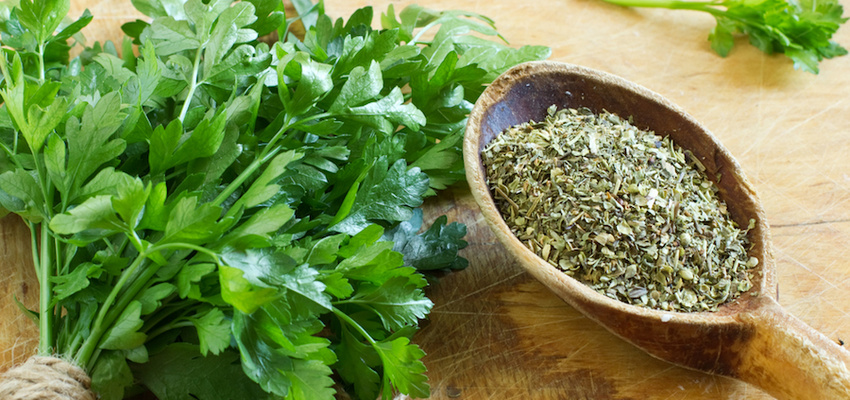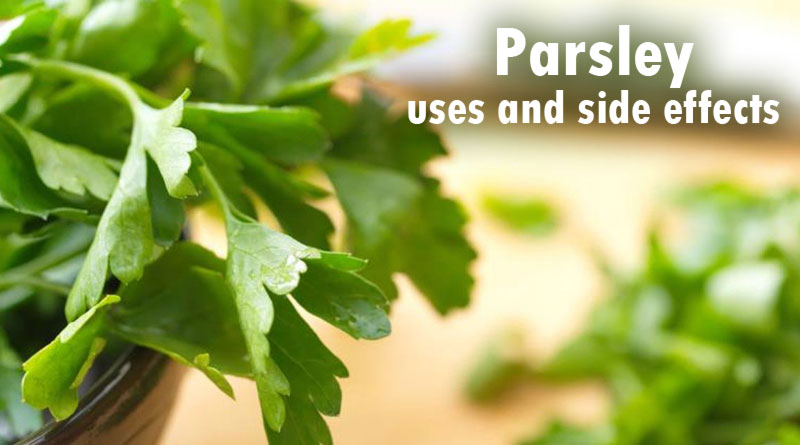Parsley uses and side effects:
Parsley is an herb. The leaf, seed, and root are used to make medicine. It is used for urinary tract infections (UTIs), kidney stones (nephrolithiasis), gastrointestinal (GI) disorders, constipation, jaundice, intestinal gas (flatulence), indigestion, colic, diabetes, cough, asthma, fluid retention (edema), osteoarthritis, “tired blood” (anemia), high blood pressure, prostate conditions, and spleen conditions. It is also used to start menstrual flow, to cause an abortion, as an aphrodisiac, and as a breath freshener.
Some people apply it directly to the skin for cracked or chapped skin, bruises, tumors, insect bites, lice, parasites, and to stimulate hair growth. In foods and beverages, it is widely used as a garnish, condiment, food, and flavoring.
In manufacturing, parsley seed oil is used as a fragrance in soaps, cosmetics, and perfumes.

How does it work?
It might help stimulate the appetite, improve digestion, increase urine production, reduce spasms, and increase menstrual flow.
PARSLEY Uses & Effectiveness
- Kidney stones.
- Urinary tract infections (UTIs).
- Cracked or chapped skin.
- Bruises.
- Tumors.
- Insect bites.
- Digestive problems.
- Menstrual problems.
- Liver disorders.
- Asthma.
- Cough.
- Fluid retention and swelling (edema).
- Other conditions.
Side Effects & Safety
It is LIKELY SAFE when consumed in amounts commonly found in food. It is POSSIBLY SAFE for most adults when taken by mouth as medicine, short-term. In some people, parsley can cause allergic skin reactions. Consuming very large amounts of parsley is LIKELY UNSAFE, as this can cause other side effects like “tired blood” (anemia) and liver or kidney problems. Also, parsley seed oil applied to the skin is LIKELY UNSAFE as it can cause the skin to become extra sensitive to the sun and cause a rash. Not enough is known about the safety of applying parsley root and leaf to the skin.
Special Precautions & Warnings:
Pregnancy and breast-feeding: Parsley in food amounts is fine, but in larger medicinal amounts is LIKELY UNSAFE when taken by mouth during pregnancy. It has been used to cause an abortion and to start menstrual flow. In addition, developing evidence suggests that taking An-Tai-Yin, an herbal combination product containing parsley and dong quai, during the first three months of pregnancy increases the risk of serious birth defects. If you are pregnant, stick with using only the amount of parsley typically found in food.
Not enough is known about the safety of using parsley in medicinal amounts during breast-feeding. It’s best not to use more than typical food amounts of parsley.
Diabetes: This plant might lower blood sugar levels. Watch for signs of low blood sugar (hypoglycemia) and monitor your blood sugar carefully if you have diabetes and use parsley. .
Fluid retention (edema): There is a concern that parsley might cause the body to hold onto sodium (salt), and this increases water retention.
High blood pressure: There is a concern that parsley might cause the body to hold onto sodium (salt), and this could make high blood pressure worse.
Kidney disease: Don’t take parsley if you have kidney disease. It contains chemicals that can make kidney disease worse. .
Surgery: This plant might lower blood glucose levels and could interfere with blood sugar control during and after surgical procedures. Stop using parsley at least 2 weeks before a scheduled surgery.

Interactions:
Moderate Interaction: Be cautious with this combination
- Warfarin (Coumadin) interacts with PARSLEY
Warfarin (Coumadin) is taken to thin the blood and slow blood clotting. Large amounts of parsley leaf might increase blood clotting. Taking this plant along with warfarin might decrease how well warfarin (Coumadin) works to thin the blood.
- Water pills (Diuretic drugs) interacts with PARSLEY
This plant seems to work like a “water pill” by causing the body to lose water. Taking parsley along with other “water pills” might cause the body to lose too much water. Losing too much water can cause you to be dizzy and your blood pressure to go too low.
Some “water pills” include chlorothiazide (Diuril), chlorthalidone (Thalitone), furosemide (Lasix), hydrochlorothiazide (HCTZ, HydroDIURIL, Microzide), and others.
Minor Interaction: Be watchful with this combination
- Aspirin interacts with PARSLEY
Some people are allergic to this plant and aspirin might increase your sensitivity. This has only been reported in one person.
References:
http://www.parsiteb.com
webmd
 Parsi Teb Physical and Mental Health Journal
Parsi Teb Physical and Mental Health Journal 



